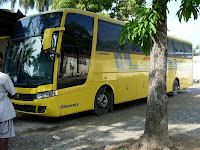Bernadette arrives each morning at about 8.00am, usually as we are finishing breakfast. We are able to cook a little for ourselves – and breakfast is varied and nutritious as long as we like fruit, eggs, toast and peanut butter! (homemade) The fruit is ripe, sweet and delicious: papaya, banana (called “fig” or “figue” in Creole – the word “banana” is reserved for plantains), pineapple, (confusingly called “anana”) and mango are regulars, and guavas, grapefruit, oranges, and soursop (no, I had never heard of it either) make more occasional appearances.
Bernadette prepares lunch – salad type food, and also cooks dinner. And dinner is tasty, varied and supersubstantial! All cooked over a charcoal cooker or two. We eat beef based vegetable stews, rice and beans – both white and black, chicken as fresh as can be – frequently bought live and introduced to the pot at the last minute... Little is stored as fresh or frozen (given the precarious nature of the electricity supply) so Bernadette makes daily or twice daily visits to the market.
 Somehow in my last visit the market had escaped me, so a visit today was a first, and somewhat enlightening.
Somehow in my last visit the market had escaped me, so a visit today was a first, and somewhat enlightening.
There is one supermarket in cap-Haitien – population 190,000 – expensive, and with an armed guard on permanent duty outside. Inside, the air-conditioning is enough to account for some of the prices, and there is a limited but predictable supply of coffee, milk, frozen goods and vegetables – with a booze section. There are also a number of small roadside shops – poorly supplied, and as varied as a pharmacy – no prescriptions needed – clothes shops and many, many lottery outlets.
However it seems most residents buy their food from the markets, and a visit today, even relatively early, found the streets crowded. There is a covered market – the Marche Fer – which is predominately food, and inside there are colourful stalls of peppers, onions, beans, fruit, etc, in close proximity to charcoal (for cooking) soap in long bars, and washing powder in vast barrels sold by the cup. Nearby was less familiar dried fish, live crabs and even two tubs with turtles swimming around (turtle soup is a delicacy). Chickens are invariably sold live to ensure freshness... Round the corner a further market sported stall after stall of shoes – new and second hand, in numbers from 10-12 up to several hundreds. Bags, clothes, interspersed with artificial flowers and toiletries. There were even stalls selling drugs – some unnamed capsules, and some branded medication for hypertension. (If you take Lisinopril for your blood pressure let me know and I’ll try and get you some!)

It helps to know the price of things, as the
price quoted to whites (“blan” or “blanc”) is invariably higher to start with,
much higher. And within the market there
are smaller traders who are trying to make a living offering 2 or 3 bananas, or
bunches of herbs, balanced in trays on their head or in their arms. As much as I would like to be assimilated
into, and understand ordinary Haitian living, I suspect market shopping is
always going to be a specialist field, best left to experts. Thanks Bernadette.





 The coach line operates daily, with the incoming service arriving in Cap Haitien late in the afternoon. The coach is locked away in a compound over night, and departing passengers are invited to assemble at 8.00am. Tickets are checked, baggage is tagged and loaded, and we are invited to board. The coach is designed to hold over 50 passengers, but it seems like we are less than 20. All of us, if we want it, can get a window seat, and on some signal (which wasn't able to discern) the coach leaves, and so I begin my journey back to the UK.
The coach line operates daily, with the incoming service arriving in Cap Haitien late in the afternoon. The coach is locked away in a compound over night, and departing passengers are invited to assemble at 8.00am. Tickets are checked, baggage is tagged and loaded, and we are invited to board. The coach is designed to hold over 50 passengers, but it seems like we are less than 20. All of us, if we want it, can get a window seat, and on some signal (which wasn't able to discern) the coach leaves, and so I begin my journey back to the UK.


